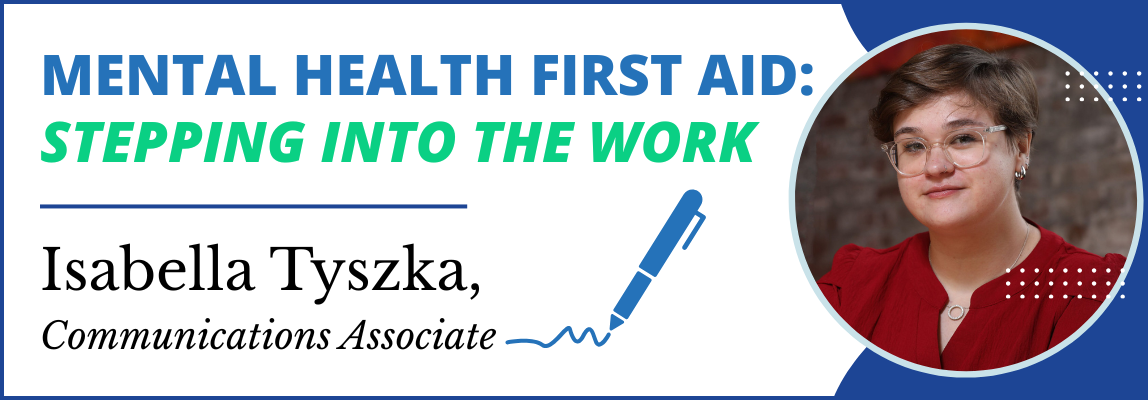In our personal and professional lives, we often prepare ourselves for emergencies: fire drills, CPR certifications, and stocking first aid kits. We’re trained to respond quickly when someone is physically injured or in danger. But how prepared are we to respond when someone is experiencing a mental health crisis?
This week, I had the opportunity to complete a virtual Mental Health First Aid (MHFA) training course offered by the Quality Institute, and the experience has changed the way I approach and think about helping others. I am now equipped with the tools to notice when someone may be struggling and to respond in ways that are supportive and meaningful.
Mental Health First Aid is an early intervention public education program, founded in Australia in 2000 by educator Betty Kitchener and mental health researcher Professor Tony Jorm. In 2008, the National Council for Mental Wellbeing, the Maryland Department of Health, and the Missouri Department of Mental Health introduced the trainings to the United States.
MHFA teaches participants to identify and address the signs of mental health or substance use challenges and to respond with empathy, support, and appropriate resources. The course includes a blend of evidence-based instruction, small-group discussions, and hands-on practice with realistic scenarios.
I did the required 2 hours of pre-course work before attending a full-day session via Zoom. The pre-work includes an interactive overview of the program, video lessons, and quizzes designed to provide a foundation for the course before I met with the instructor and learning group.
Like the other participants, I completed nine modules and familiarized myself with the Participant Processing Guide and the Self-Care Template. Once the Zoom session began, I engaged in a series of collaborative exercises and group discussions that followed each scenario or video.
Through these exercises, I began to think differently about mental health as a daily reality that touches us all and is not limited solely to clinical settings. I was particularly drawn to the emphasis on “person-first” language to normalize support, reduce stigma, and enable us to become better allies for those experiencing mental health and substance use challenges.
As a Communications Associate here at the Quality Institute, I don’t typically engage with health care initiatives on the clinical or programmatic level. That’s precisely why this training was so impactful: it offered a rare and valuable chance to step into the world of public health from a different angle, not just to write about public health, but to participate in a personal and hands-on way. Most of all, the training taught me that sometimes, the most powerful thing you can do for someone is to offer your presence and a listening ear. It’s your willingness to say, “I am here for you, and you are not alone.” We all want to be understood, and it is essential to keep an open mind and connect people who are struggling to the next steps, such as professional help if necessary.
If you’ve never taken an MHFA course, I sincerely encourage you to consider it. Whether you work in health care or, like me, support the field in a non-clinical capacity, this training truly is for everyone. It’s an opportunity to work on your skills and abilities to lead with empathy, act confidently, and purposefully support others.
Through Quality Institute’s Mayors Wellness Campaign, we offer Adult and Youth MHFA trainings to the public, including mayors, public health officers, community leaders, and others. We also provide Perinatal MHFA trainings to community health workers, doulas, nurses, and others who support their pregnant or postpartum patients and clients.
Whether you serve in a professional role or simply want to be better prepared to help someone in need, this training will equip you with the tools to support your loved ones and the greater community. To learn more and register for an MHFA session, please visit: https://njhcqi.info/registermwcmhfa.

